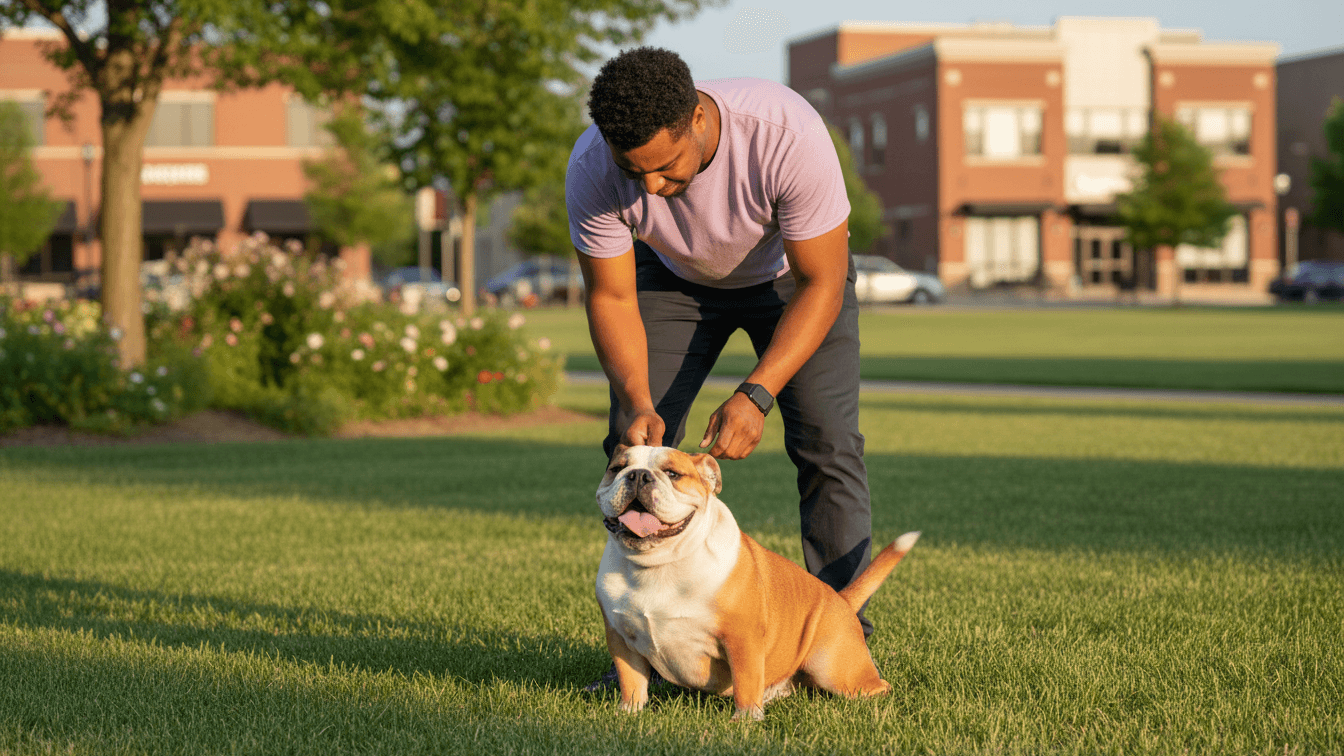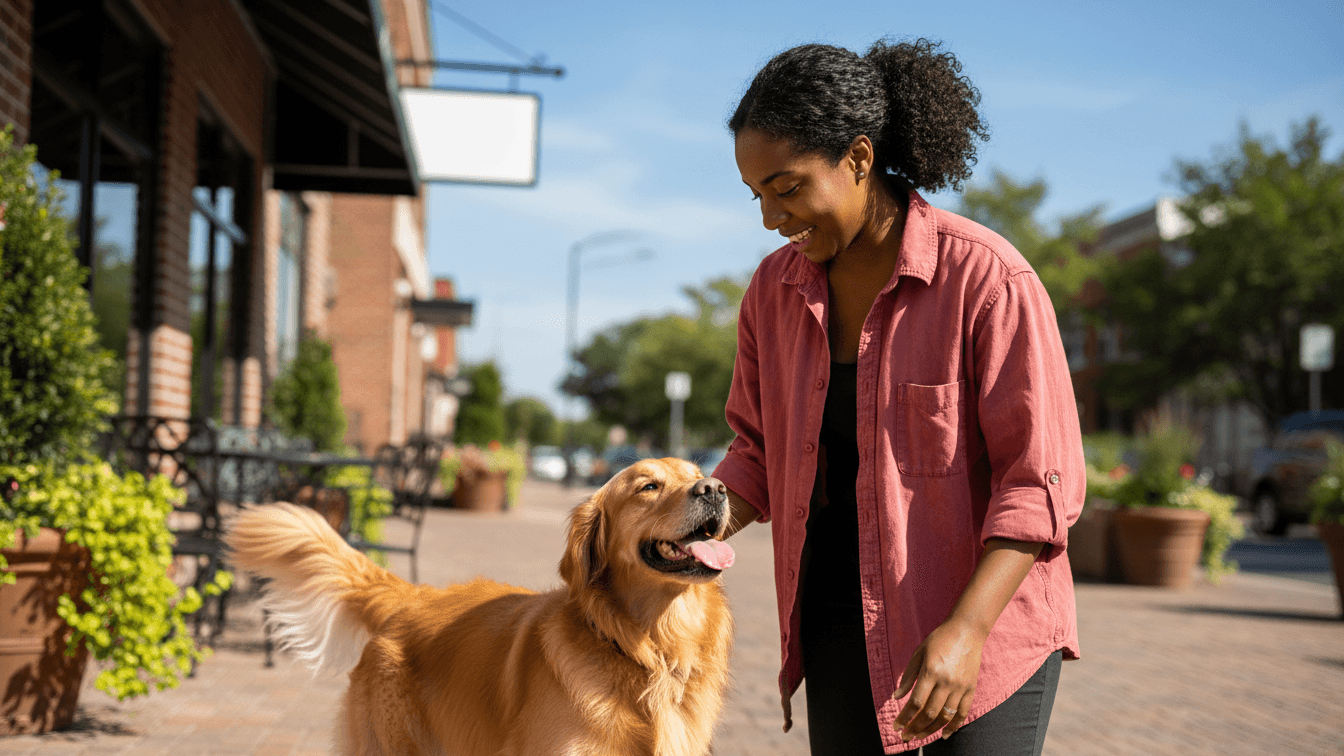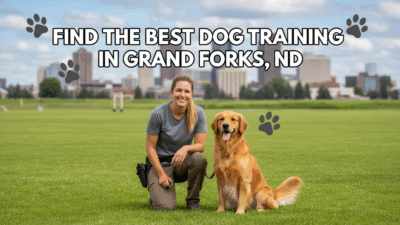Your Complete Guide to Choosing a Dog Trainer in Grand Forks and Surrounding Areas
Living with a dog in Grand Forks means managing snowy winters, busy downtown streets, and plenty of chances to get your dog out along the Red River Recreation Area trails. Your dog needs to handle freezing temperatures, icy sidewalks, and stay calm when encountering other dogs at Lincoln Drive Park.
Grand Forks sits in Grand Forks County, and most local rules follow city and county ordinances. When you find a professional dog trainer who understands these local details, you’ll get better results both at home and around your neighborhood.
How to Choose the Right Trainer
Start by looking for someone who uses positive reinforcement training and can set realistic goals for your Grand Forks lifestyle. This means your dog should learn to walk politely on winter sidewalks, stay focused around University of North Dakota campus activity, and handle indoor training when outdoor work isn’t practical.
Credentials give you a quick way to compare experience levels. Common dog trainer certifications include KPA-CTP, CPDT-KA, or IAABC-CDBC for behavior problems. If your dog has serious aggression issues or reactivity concerns, look for someone with CBCC-KA or a science-based program like CTC.
In-home dog training works great for puppy manners, door greetings, and neighborhood leash skills around the Near Southside or Riverside neighborhoods. Group classes make sense once your dog can focus around other dogs, especially before you try busier spots like Columbia Mall or downtown events.
Common Dog Training Methods Explained

Reward-based methods build the trust you want while creating lasting behavior changes. They also help you follow Grand Forks ordinances about keeping dogs under control in public.
Basic obedience covers sit, down, stay, place, recall, and leash training so your dog can handle walks, visits to pet-friendly businesses, and park outings without pulling or jumping on people. These skills matter even more when sidewalks are slippery or when you need your dog to stay close during heavy traffic.
Puppy training focuses on socialization, potty training, bite control, crate comfort, and early leash work. Starting with short, positive training sessions prevents bad habits from forming in the first place. Winter puppy training often requires extra indoor work and careful paw care after outdoor potty breaks.
Behavior modification addresses fear, reactivity, resource guarding, or separation anxiety through careful desensitization and counterconditioning. For serious cases, ask if your trainer works with local veterinarians who understand behavior issues.
Private lessons and in-home sessions let you customize everything around your daily routines, while day training can speed up results when you’re short on time. Board and train programs offer intensive work but require careful research to ensure the facility uses humane methods and provides detailed handoff sessions.
Dog training classes help your dog practice good manners around other dogs and people. The best classes give dogs plenty of space, screen participants carefully, and teach calm behavior rather than just excitement. Look for programs that understand the challenges of maintaining training through long North Dakota winters.
Specialized training like therapy dog training or service dog training requires extra structure, public-access skills, and a very clear step-by-step training program. These programs demand consistent practice in various public settings throughout Grand Forks.
Stay away from trainers who use fear, intimidation, or pain to get results. Humane methods are safer for everyone, easier to maintain long-term, and much better for keeping peace with your neighbors in close-knit Grand Forks communities.
Average Cost of Dog Training in Grand Forks ND and Surrounding Areas (Updated for 2025)
Prices around Grand Forks and Grand Forks County depend on the trainer’s experience, how long sessions last, and where the training happens. Here’s what most local pet owners are paying in 2025.
| Service Type | Average Cost (Grand Forks/Grand Forks County) |
|---|---|
| Puppy classes (4-6 weeks) | $130-$240 total |
| Group obedience classes (4-6 weeks) | $140-$260 total |
| Private lessons (60-90 min) | $90-$160 per session |
| In-home coaching packages (4-6 visits) | $380-$800 total |
| Day training (trainer works your dog + handoff) | $400-$850 per week |
| Behavior consult for reactivity/anxiety (initial) | $120-$220 |
| Board and train (2-4 weeks) | $1,800-$4,200 total |
You’ll probably pay extra travel fees for locations farther from the city center, and expect higher rates for complex behavior work or specialized dog training services like aggressive dog training.
Make sure you understand what’s included, how the trainer tracks progress, and whether they offer a free consultation or free evaluation before you sign up.
Questions to Ask a Potential Dog Trainer
- What training methods do you use, and how do you keep sessions positive and low-stress?
- What credentials do you have, like KPA-CTP or CPDT-KA? Do you keep up with continuing education such as CPDT-KSA?
- How will you customize the training program for my dog’s specific needs and our Grand Forks lifestyle, including winter conditions?
- Do you offer in-home visits, dog obedience training classes, or day training, and which approach fits my goals best?
- How will we measure my dog’s progress and know when to add more distractions?
- What are the total costs, including any travel fees, and what’s your cancellation policy?
- Do you carry liability insurance, and can you show me proof?
- For behavior problems, will you work with my veterinarian if needed?
- What should I practice between our training sessions to help your dog keep improving?
- How do you handle winter training when outdoor work is limited by cold temperatures?
Local Grand Forks Rules and Considerations
Grand Forks enforces leash laws and nuisance rules to keep parks and neighborhoods safe for everyone. Understanding these regulations helps you and your trainer create realistic goals.
Leashes are required in all public spaces except inside designated off-leash areas at dog parks. Keep a standard 6-foot leash with you for city parks, greenways, and downtown areas. This is especially important during winter when visibility can be reduced and footing uncertain.
North Dakota law requires current rabies vaccination for all dogs. You can get these through local veterinary clinics, and vaccination records must be kept current.
Excessive barking can be considered a nuisance under city ordinances, so work with your trainer on alert barking and separation anxiety before neighbors start complaining. If your trainer wants to use city parks for commercial sessions, they may need permits and proof of insurance.
North Dakota doesn’t require special licenses for dog trainers, but if a business boards dogs for payment, the state’s Board of Animal Health may have oversight regarding boarding facilities. Expert dog trainers typically carry liability insurance to protect themselves and their clients.
The City of Grand Forks Animal Control handles lost pets, licensing information, and enforcement of local ordinances related to pet ownership.
Local Grand Forks Resources for Dog Owners
These spots give you great places to practice polite manners, work on recalls, and provide safe enrichment for training for dogs. Always follow the posted rules and etiquette guidelines.
- Grand Forks Dog Park at Lincoln Drive Park offers a fenced area where dogs can practice off-leash skills and socialization with other dogs during appropriate seasons
- Red River State Recreation Area welcomes leashed dogs on trails, which gives you perfect opportunities to build focus around wildlife, cyclists, and other trail users
- Riverside Park provides walking paths where you can practice leash manners and calm behavior around families and park activities
- University Park offers open spaces for leashed walking practice and exposure to various distractions in a controlled environment

FAQs
How much does in-home dog training cost?
Most Grand Forks trainers charge $90-$160 per in-home visit, with discounts available when you buy packages. Behavior problems typically start at the higher end of that range.
Is in-home dog training worth it?
Absolutely, because you’re working on problems exactly where they happen. Your trainer can fix door manners, jumping on guests, counter-surfing, and yard reactivity right at home, then step outside to practice leash skills on your actual neighborhood sidewalks. This is especially valuable during winter months when attending group classes is less convenient.
Can you pay someone to house train your dog?
Yes, many trainers offer puppy training programs that include potty training, crate routines, and daily schedules. Day training can speed up the process while teaching you how to maintain the progress. Winter potty training in Grand Forks requires extra attention to paw care and creating reliable outdoor routines despite cold temperatures.
What is the 3-3-3 rule for dog training?
This is a helpful timeline for new or adopted dogs: expect about 3 days for your dog to decompress, 3 weeks to learn your routines, and 3 months to feel completely settled. Good training plans work with this natural adjustment period rather than rushing the process.
How long will it take to reach my training goals?
Most puppies and friendly adult dogs show solid progress within 4-8 weeks if you practice daily. Fear, reactivity, or separation anxiety typically requires several months of careful behavior modification with gradual increases in difficulty. Seasonal factors in Grand Forks may extend timelines when outdoor practice is limited by extreme cold.
What should I bring to group classes?
Pack a flat collar or harness, a 6-foot leash, high-value treats, water, and current vaccination records if your trainer requests them. Leave retractable leashes at home for safety reasons. During winter months, bring towels to dry off your dog after entering heated indoor training spaces.
What’s the leash law in Grand Forks?
Dogs must be leashed and under control in all public areas, except inside designated off-leash sections of dog parks. Keep that 6-foot leash handy for city parks, trails, and public events throughout Grand Forks.
Do I need a dog license in Grand Forks or Grand Forks County?
Yes, the City of Grand Forks requires dog licenses for all dogs over six months old. You’ll need proof of current rabies vaccination to obtain a license. Contact Grand Forks Animal Control for current fees and registration procedures.
What shots does my dog need in Grand Forks County or North Dakota?
Rabies vaccination is required by North Dakota state law for all dogs. Your veterinarian may also recommend distemper-parvo, bordetella, and other vaccines based on your dog’s lifestyle and exposure risks. Keep vaccination records current, especially if you plan to use boarding facilities or attend dog training classes.
Are dog trainers required to be licensed in Grand Forks or Grand Forks County or North Dakota?
No special trainer licenses exist in North Dakota. Trainers follow normal business regulations, but if they offer board and train services, their facility may need to meet state boarding kennel requirements under the North Dakota Board of Animal Health. Look for certified dog trainer credentials like CPDT-KA or KPA-CTP to verify education and experience.
Where can I practice off-leash recall?
Use the fenced dog park at Lincoln Drive Park to keep things safe and legal. Try visiting during quieter hours when you’re starting out. Always ensure your dog has reliable recall before attempting off-leash work, and respect seasonal closures during muddy or icy conditions.
Which dog parks allow training around Grand Forks?
Lincoln Drive Park Dog Park allows off-leash practice within its fenced area. This is the primary dedicated space in Grand Forks where you can work on recall, socialization, and play behavior with your well-behaved dog. Follow all posted rules and clean up after your pet.
What beaches or trails allow dogs for training?
While Grand Forks doesn’t have ocean beaches, leashed dogs are welcome on trails at Red River State Recreation Area and most city parks. These locations are perfect for teaching calm focus around other trail users, practicing loose-leash walking, and building your dog’s confidence in various outdoor environments. Always keep your dog leashed unless in designated off-leash areas.
How do I handle winter training in Grand Forks?
Winter conditions require adjustments to your training plan. Focus on indoor obedience training during extreme cold, use booties or paw wax to protect your dog’s feet during outdoor sessions, and keep training sessions shorter when temperatures drop. Many trainers offer more indoor work during winter months and increase outdoor practice as temperatures moderate.
What if my dog is reactive on walks in my neighborhood?
Work with a trainer experienced in behavior modification and reactivity. They can help your dog learn to stay calm when encountering other dogs on narrow, snow-banked sidewalks or in tight spaces common during Grand Forks winters. Early morning or late evening walks may offer quieter practice times with fewer triggers.
The right combination of thoughtful planning, humane methods, and consistent practice around Grand Forks neighborhoods and parks will help your dog become a confident, top dog companion. If credentials matter to you, don’t hesitate to ask about dog trainer certifications and how your trainer stays current with new techniques through continuing education.
